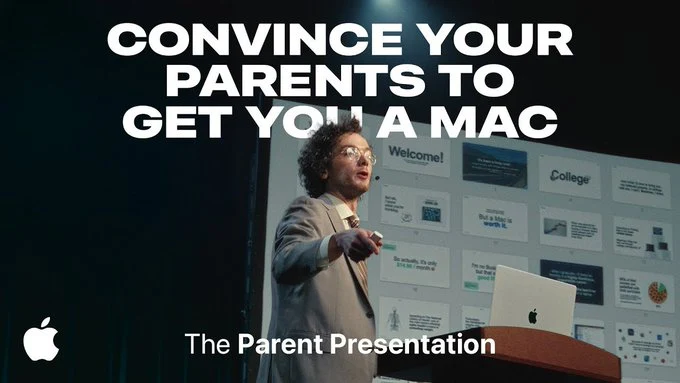Apple Parent Presentation Ad Pulled From YouTube: What Happened and Why It Matters
Apple recently removed its "Parent Presentation" ad from YouTube, and the internet is buzzing with speculation. The apple parent presentation ad, part of a back-to-school campaign targeting college students, was launched and then swiftly hidden just a day later. While Apple hasn’t provided an official explanation, many users online suspect the brand responded to negative feedback and social media backlash. This post breaks down what the ad was about, why it was pulled, and how it reflects Apple's evolving advertising strategy.
Image : GoogleThe Apple Parent Presentation Ad: A Quick Recap
Apple’s ad, titled The Parent Presentation, was aimed at persuading parents to buy a Mac for their college-bound children. The ad featured a student giving a PowerPoint-style presentation to their parents, complete with exaggerated graphs, emotional appeals, and comedic one-liners. It was posted prominently on Apple’s College Students landing page and uploaded to YouTube. But within 24 hours, the apple parent presentation ad was marked private, and its visibility on Apple’s own site was drastically reduced—moved from the top of the page to near the bottom.
Apple has not commented officially on the removal, which leaves room for a lot of speculation. However, this isn’t the first time Apple has walked back an ad campaign. A similar situation occurred with previous ads that either didn’t resonate with audiences or stirred controversy, forcing the company to quietly retreat.
Why the Apple Parent Presentation Ad Faced Backlash
Initial reactions to the ad were mixed. While some viewers found the video humorous and relatable, others criticized it as being “cringe” or trying too hard to appeal to Gen Z and Gen Alpha humor. On platforms like X (formerly Twitter), Reddit, and TikTok, users posted parodies and memes, some of which mocked the acting and scripting. The core idea behind the apple parent presentation ad—a teenager begging their parents for a Mac using corporate buzzwords—seemed to strike the wrong chord with a segment of Apple’s audience.
This reaction reflects a growing challenge for tech brands trying to market to younger audiences: authenticity. Gen Z is quick to spot content that feels manufactured or tone-deaf, especially when it comes from legacy companies like Apple. The backlash may have prompted the company to pull the video early to avoid further damage to its brand perception.
Apple’s History With Ad Reversals and Audience Sensitivity
Apple’s removal of the apple parent presentation ad aligns with its cautious approach to public perception. In the past, the company has quietly taken down or edited marketing content that didn’t land well. For example, earlier in 2024, Apple modified its AI-related Vision Pro promo materials after criticism from accessibility advocates. Similarly, a “crush the competition” iPad ad from years ago was taken down due to accusations of being too aggressive in tone.
This pattern shows that Apple is highly responsive to consumer sentiment—even when it doesn’t publicly acknowledge doing so. The removal of this recent ad suggests that Apple is listening closely to online chatter, especially among students and younger buyers who represent a vital growth segment for Mac sales.
What’s more, burying the ad on its website indicates an internal pivot without a full public retraction. It’s a subtle way of saying, “Let’s move on,” without fueling more headlines than necessary. That said, transparency about these decisions could help Apple build more trust with its digitally-savvy audiences.
What This Means for Apple's Marketing Strategy Moving Forward
The sudden withdrawal of the apple parent presentation ad may trigger a rethink of Apple’s content tone and strategy in future campaigns. If Apple wants to remain relevant among digital natives, it needs to strike a balance between humor, authenticity, and the premium feel that defines its brand. While playful marketing isn’t new to Apple, the approach must resonate rather than repel. This event could also influence how the company tests content before wide release—perhaps involving more focus groups or soft-launch testing via social platforms.
Furthermore, with the back-to-school shopping season fast approaching, Apple will likely release revised campaigns that better reflect student values and needs. That may include spotlighting educational benefits, long-term value, and ecosystem perks—rather than just making parents laugh. Apple has always excelled at aspirational marketing, and the response to the apple parent presentation ad is a reminder that even the best brands occasionally misfire.
In the end, this brief ad blip offers a fascinating look into the intersection of brand strategy, public perception, and the unforgiving pace of social media. Whether Apple chooses to retool and relaunch the ad or move in a different direction entirely, the experience reinforces the need for adaptability in modern marketing.


